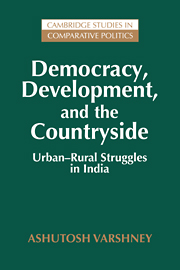
-
Select format
-
- Publisher:
- Cambridge University Press
- Publication date:
- December 2009
- April 1995
- ISBN:
- 9780511609367
- 9780521646253
- Dimensions:
- Weight & Pages:
- Dimensions:
- (228 x 152 mm)
- Weight & Pages:
- 0.357kg, 232 Pages
You may already have access via personal or institutional login
Book description
Several scholars have written about how authoritarian or democratic political systems affect industrialization in the developing countries. There is no literature, however, on whether democracy makes a difference to the power and well-being of the countryside. Using India as a case where the longest-surviving democracy of the developing world exists, this book investigates how the countryside uses the political system to advance its interests. It is first argued that India's countryside has become quite powerful in the political system, exerting remarkable pressure on economic policy. The countryside is typically weak in the early stages of development, becoming powerful when the size of the rural sector defies this historical trend. But an important constraint on rural power stems from the inability of economic interests to overpower the abiding, ascriptive identities, and until an economic construction of politics completely overpowers identities and non-economic interests, farmers' power, though greater than ever before, will remain self-limited.
Contents
Metrics
Altmetric attention score
Full text views
Full text views help Loading metrics...
Loading metrics...
* Views captured on Cambridge Core between #date#. This data will be updated every 24 hours.
Usage data cannot currently be displayed.
Accessibility standard: Unknown
Why this information is here
This section outlines the accessibility features of this content - including support for screen readers, full keyboard navigation and high-contrast display options. This may not be relevant for you.
Accessibility Information
Accessibility compliance for the PDF of this book is currently unknown and may be updated in the future.


